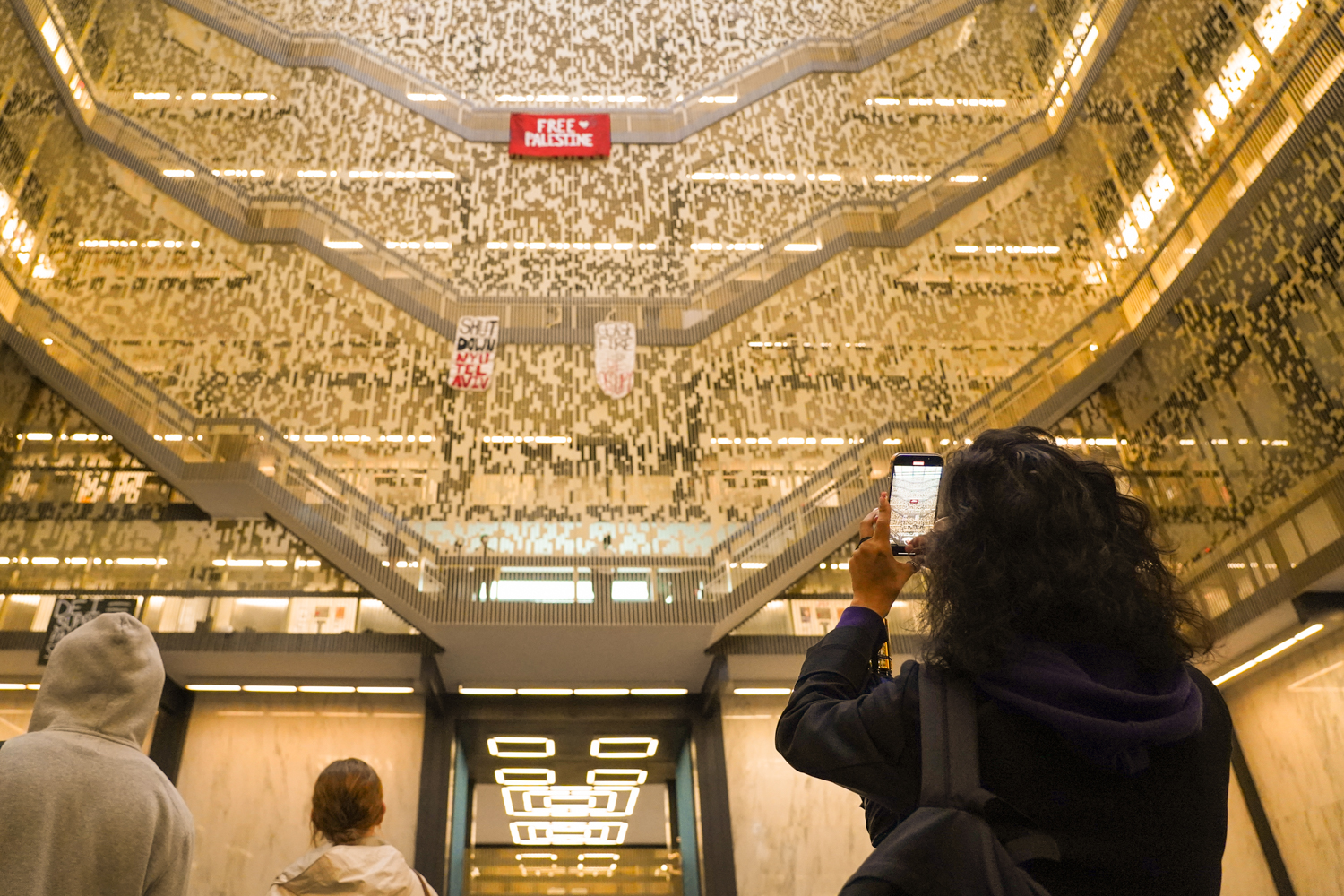
On-campus tensions over the Israel-Hamas war came to a head this afternoon, when members of Students for Justice in Palestine and Faculty for Justice in Palestine hung signs reading “Free Palestine,” “cease-fire then de-occupy” and “shut down NYU Tel Aviv” on the railing of Bobst Library’s atrium.
As a group of around nine FJP members spoke to a crowd of at least 30 on the bottom floor of Bobst through a microphone, a group of Campus Safety officers stood by the library’s entrances and also closed the elevators to the 12th floor, where NYU president Linda Mills’ office is located.
The professors read an Oct. 11 letter written by teachers and employees at Birzeit University in Ramallah in support of Palestinian resistance and academic freedom. They also read stories and poems describing life in the occupied West Bank and Gaza Strip since 1948.
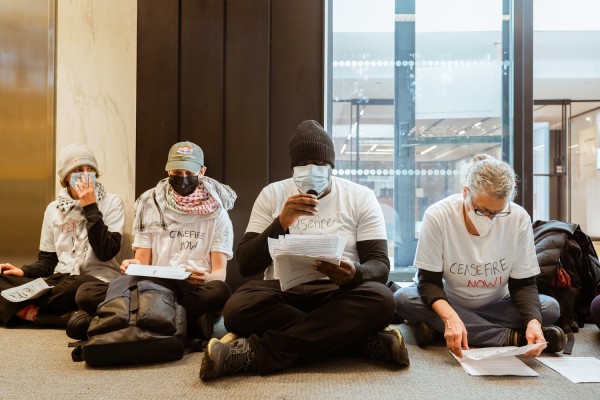
“This is to help respond to the loud silence around the suffering of Palestinian children, families and communities,” speaker and CAS professor L’Heureux Lewis-McCoy said. “Our goal is to make sure that every life has value and that a cease-fire is a priority for us. We don’t want to see another life lost and we think NYU has a responsibility in making sure that people’s lives are saved and that we have a different path forward.”
Two weeks ago, Hamas — the Palestinian militant group that controls the Gaza Strip — launched a rocket attack into nearby towns in southern Israel, killing around 1,400 civilians and taking more than 200 hostage. In response, the Israeli military sent airstrikes into Gaza and placed a total blockade on the region, killing nearly 4,000 and cutting off more than 2 million from food, water and electricity.
At the same time, students have been protesting over the conflict on campus and around the city, with some groups protesting Hamas’ attack, and others calling for humanitarian aid and a stop to Israel’s airstrikes in Gaza. Earlier this week, two NYU students were caught tearing down posters of Israeli hostages outside the Stern School of Business, which could result in disciplinary action, according to a statement from university spokesperson John Beckman.
“Free expression is a bedrock principle for the university,” Beckman said in another statement to WSN. “The protesters were informed that hanging banners and using amplification in the library or otherwise disrupting university operations violates the university’s rules, and the protest ended shortly thereafter. Given the heightened sensitivity around current events, we expect that people will exercise free expression respectfully and responsibly.”
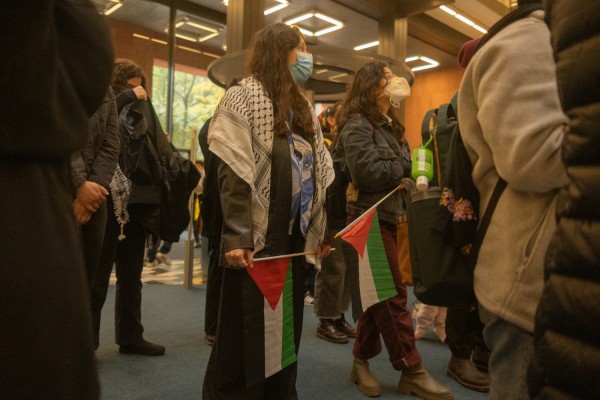
Senior Annabel Parker, a Jewish student who witnessed the protest from the library’s ground floor, said they were upset by it, but that people should be upset given the ongoing violence in the conflict.
“It’s jarring, but that is maybe what’s necessary in this case,” Parker said. “The biggest thing is just be conscious and specific about the language that you’re using to address things and be aware that you don’t always need to comment on things when you don’t know about them. There are people who do know about this and we should be letting them speak.”
In the past, students have said the university’s Tel Aviv site violates NYU’s Code of Ethical Conduct and Non-Discrimination and Harassment Policy because of an Israeli law preventing foreigners who have called for a boycott of the country from entering its borders. The university has publicly said a boycott of the campus would be a violation of academic freedom.
“I’m really happy to see tenured faculty taking the stand, particularly because NYU as an institution has been not only silent, but pretending as if there aren’t Palestinian students in this university,” senior Zachary Feldman, who witnessed the protest, said. “The idea of shutting down the Tel Aviv university is particularly interesting, because it’s a violation of the university’s own code of ethics for Palestinian students who can’t go home. The fact that we as a university don’t offer something that everyone has access to is quite egregious.”
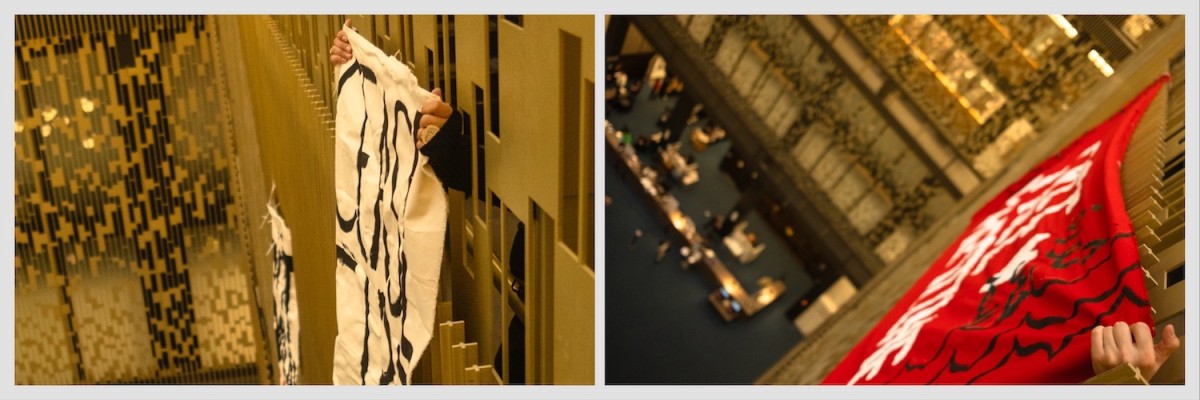
In response to Hamas’ Oct. 7 attack on Israel, Mills issued a universitywide statement condemning the “deadly terrorist attack” and saying no students, faculty or staff at NYU Tel Aviv were harmed. SJP, along with over 30 on-campus student groups, sent a letter to Mills criticizing her statement for “demonstrating a profound disregard” for Palestinian students.
Just yesterday, the Israeli government criticized the presidents of NYU, Columbia University and Harvard University for their handling of students’ response to the war through X, the social media platform formerly known as Twitter. The post included a video of a speech made by Shai Davidai, an Israeli professor at Columbia, where he said universities across the country are “harboring pro-terror student organizations.”
“To the presidents of @Columbia, @nyuniversity, @Harvard and other universities who have stood SILENT as terror supporters have marched through campus and celebrated raping women, executing children and kidnapping grandmothers, you are cowards,” the post reads.
Vasuki Nesiah, a professor at Gallatin and speaker at the demonstration, criticized NYU for silencing pro-Palestine political speech. Last week, the president of the law school’s Student Bar Association faced removal from their position and lost a job offer after sending a message in support of Palestinian resistance in a weekly newsletter. Since then, all members of the SBA resigned from the organization out of concern for their safety.
“We have seen over the last couple of weeks students in campuses all over the country getting doxxed and intimidated, and it would be great if the university administration could signal that they have students’ backs — that students could speak out and that they will protect them,” Nesiah said.
Gallatin professor Paula Chakravartty, who also spoke at the demonstration, said it is important for the university to recognize its Palestinian and Muslim students. She also said that many news outlets have been silencing Palestinian voices in their coverage.
“We want to encourage President Mills and the administration to recognize the Islamophobia that our Arab, Arab American and Muslim students, faculty and staff are facing,” Chakravartty said. “We applaud the university’s diversity, equity and inclusion policies, but we think that just like antisemitism, just like anti-Asian violence, just like anti-Black racism, Islamophobia is real as seen in many horrific ways this week.”
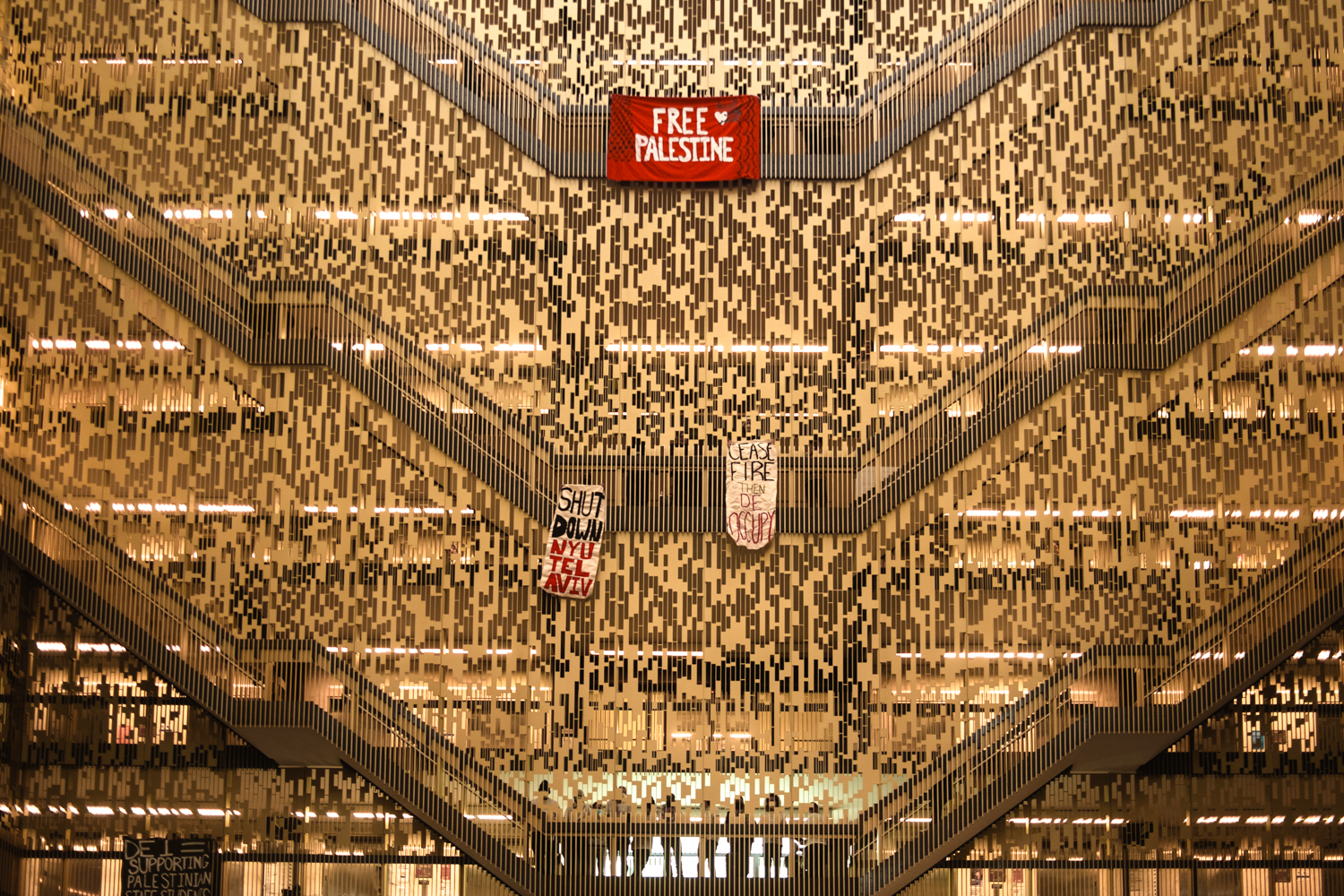
Contact Carmo Moniz and Yezen Saadah at [email protected].

























































































































































